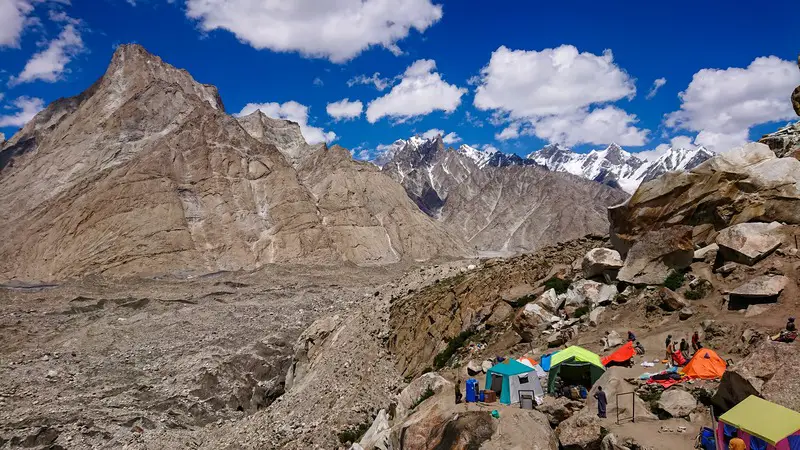German biathlon champion Laura Dahlmeier died July 28 following a mountaineering accident in Pakistan, her management team and local government officials confirmed. The 31-year-old two-time Olympic gold medalist was struck by falling rocks while climbing Laila Peak in the Karakoram mountain range at approximately 18,700 feet.
The accident occurred around noon local time on Monday when Dahlmeier was ascending the more than 19,000-foot peak with her climbing partner, Marina Eva Krauss. Krauss quickly issued a distress call after witnessing the rockfall impact, launching a rescue mission that was immediately hampered by low visibility, bad weather, and the remote location of the incident.
Krauss, who was uninjured in the accident, attempted to reach Dahlmeier for several hours but was ultimately forced to abandon the effort due to continued rockfall and dangerous terrain conditions. She managed to descend to base camp with help from rescuers on Tuesday. Rescue helicopters were unable to reach the scene until Tuesday morning due to the area’s remoteness and harsh weather conditions.
Faizullah Faraq, a spokesman for the regional Gilgit-Baltistan government, confirmed that rescuers were able to verify Dahlmeier’s death on Wednesday but could not retrieve the body because of unfavorable weather conditions. Dahlmeier’s management team indicated that, based on findings from helicopter flyovers and Krauss’ account of the severity of the injuries, the champion biathlete likely died instantly from the impact.
According to statements posted on Dahlmeier’s social media accounts, she had specifically requested that no one risk their life to recover her body in the event of an accident. Her family expressed gratitude to the rescue teams and climbers who attempted to reach her, acknowledging their efforts despite the dangerous conditions.
Recovery efforts were officially abandoned on Thursday after consultation with the Alpine Club of Pakistan, with authorities citing dangerous conditions at the accident site. German mountaineer Thomas Huber, who participated in the rescue attempt, told reporters that the decision to leave Dahlmeier’s body was made in accordance with her wishes.
Dahlmeier made history at the 2018 Winter Olympics in PyeongChang, South Korea, becoming the first female biathlete to win both sprint and pursuit gold medals at the same Games. She captured gold in the 7.5-kilometer sprint and 10-kilometer pursuit events, also earning bronze in the 15-kilometer individual competition.
The German athlete’s professional career began during the 2012-13 IBU World Cup season when she was 19 years old. She represented Germany at the 2014 Sochi Olympics, where she placed 13th in the individual event. Her breakthrough came during the 2016-17 season when she won the overall World Cup title.
Throughout her career, Dahlmeier accumulated seven gold, three silver, and five bronze medals at the Biathlon World Championships, along with 20 World Cup race victories. She retired from competitive biathlon in May 2019 at age 25, citing diminished passion for professional sports competition.
Following her retirement, Dahlmeier transitioned to mountaineering and broadcasting. She worked as a commentator on biathlon events for German broadcaster ZDF and became a state-certified mountain and ski guide in 2023. She also volunteered for the Garmisch-Partenkirchen mountain rescue team in her hometown in the German Alps.
German President Frank-Walter Steinmeier offered condolences to Dahlmeier’s parents, describing her as an exceptional sportswoman and noting that he had presented her with Germany’s highest sporting honor, the Silver Laurel Leaf, after her 2018 Olympic victories. He characterized Dahlmeier as an ambassador for Germany and a role model for peaceful international cooperation.
International Olympic Committee President Kirsty Coventry stated that “she will be remembered forever” in recognition of her historic Olympic achievements. The International Biathlon Union emphasized that her legacy within the sport and beyond would continue to inspire future athletes and adventurers.
Dahlmeier had been in the Pakistan region since late June and had successfully ascended the Great Trango Tower before attempting Laila Peak. The Karakoram mountain range attracts hundreds of climbers annually, with accidents occurring frequently due to avalanches, sudden weather changes, and rockfall conditions.
The region has experienced above-normal seasonal rainfall, triggering flash floods and landslides. Since the previous week, at least 20 Pakistani tourists had been reported missing after floodwaters swept them away near the northern district of Chilas. According to Pakistan’s National Disaster Management Authority, flooding and rain-related accidents have killed 288 people since the monsoon season began in late June.











